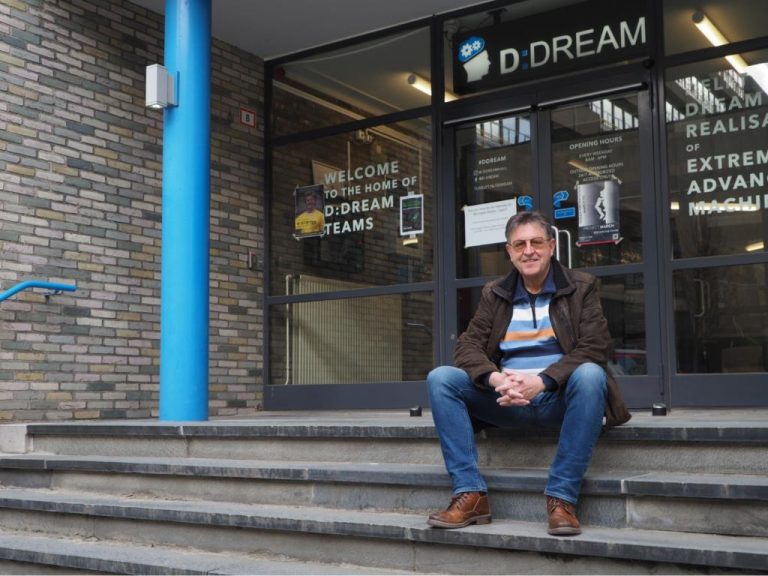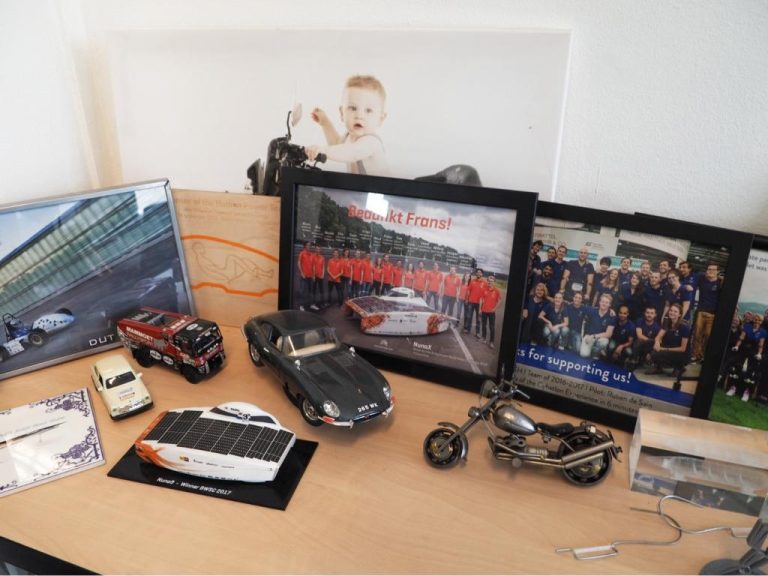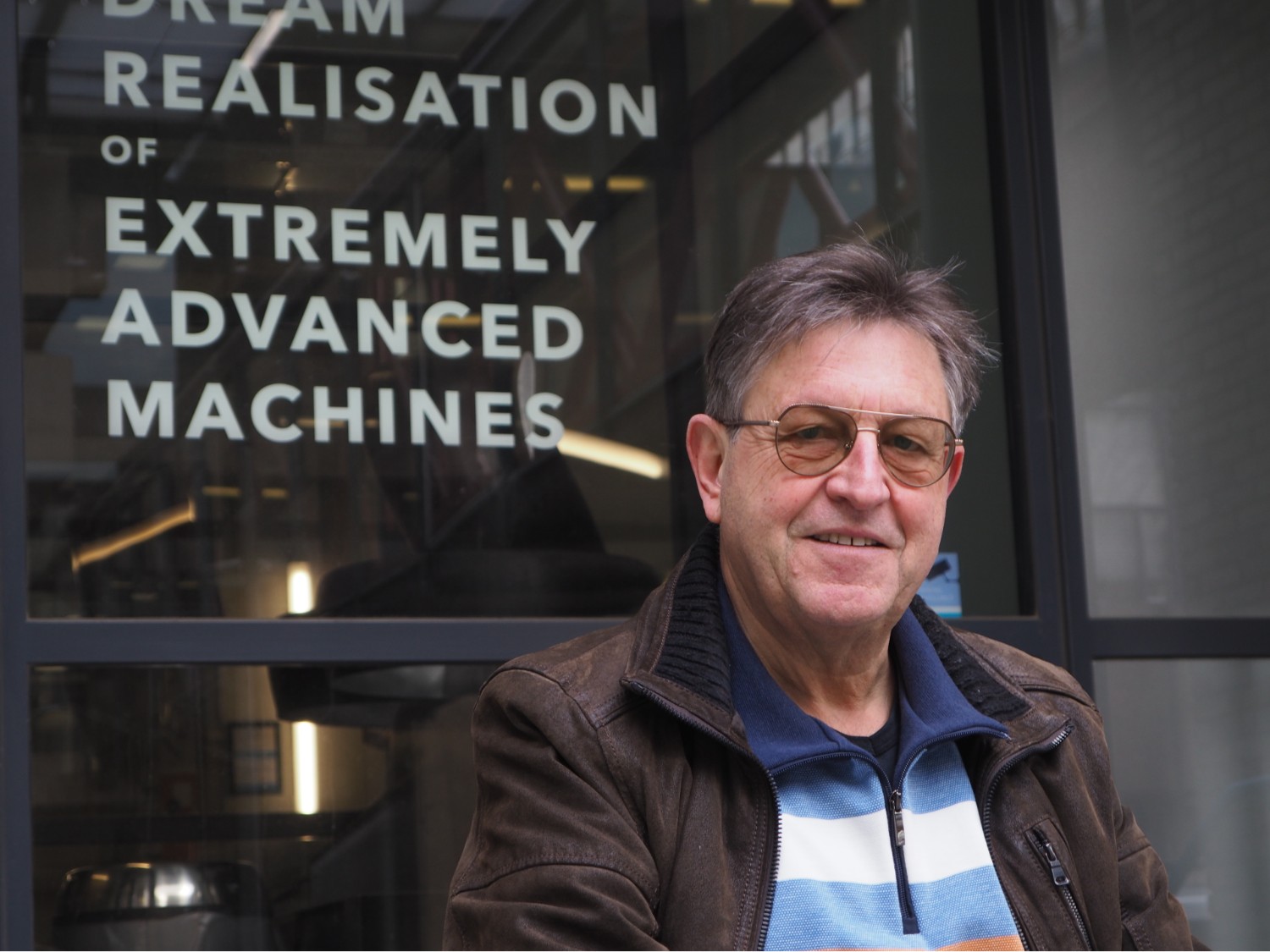When Frans van der Meijden took charge of the Dream Hall in 2014, students were sleeping under the desks and the fire brigade came regularly. It is now quieter. Too quiet?
'Students can be so motivated that they go overboard', saw Frans van der Meijden. (Photo's: Jos Wassink)
The door was always open, students cooked in their workplace and sometimes even slept there. When Frans van der Meijden took over the management of the Dream Hall from Wim Thijs, 12 Dream Teams were working in the Stevinhal behind the Faculty of Civil Engineering and Geosciences. Van der Meijden introduced a 22:00 closing time and installed a catering kitchen where students could cater once they got their basic hygiene diploma. Something would go wrong once in a while and someone sustained a burn injury, but luckily there was no lasting damage.
“I believe we achieved a lot,” says Van der Meijden now, at his farewell. “We optimised many things in terms of organisation, options and facilities.” At the same time, he sees that the number of Dream Teams has dropped from 12 to five. This was partly due to Covid and to other requirements that were imposed on Dream Teams (not only mobility), and also to a measure that the Executive Board imposed that makes joining Dream Teams very expensive for students, suggests Van der Meijden, who is trying not sound like ‘a grumpy old man’.
How did you become the Manager of the Dream Hall?
“I was the Head of Education & Student Affairs at 3mE when I started getting health problems in 2013. When I returned from sick leave, Wim Thijs asked me if I wanted to succeed him at the Dream Hall. Working with young highly motivated students was very appealing. You never have problems with motivation here. Regular education is driven by credits and everything here in the Dream Hall is driven by the mission. I support this fully – you work towards a mission for which you need knowledge. You acquire that knowledge along the way.”
Performance pressure among students
You saw highly motivated students. Did you need to sometimes give them direction or put on the brakes?
“One of the dangers is that students are so driven to work on their projects that it becomes an obsession and they go overboard. Wim Thijs still runs a workshop about dealing with this called Performance pressure among students. He thought about it carefully and made the comparison with the tensile strength of metal. You can pull metal until it reaches the yield strength. Once you exceed it you cannot go back and there will be lasting deformation. If you draw a parallel between this and your own behaviour, your will become more aware of your limits. You will realise that you should not exceed the point at which you will never return and will suffer lasting deformation.”
Have students ever gone too far?
“Students have pushed themselves too far and have suffered burnouts. That is the last thing you want. Team managers need to be watchful. They learn to recognise the signals and to send the students in question home. The Dream Hall was always open before Covid. Students napped here so that they could continue working when they woke up. That was not healthy. The Hall now closes at 22:00.”
NovaBike set fire to the whole premises
Have there been any dangerous situations in which you had to intervene?
“Students in the workplace need to be conscious of safety, particularly when they are under pressure of deadlines. Of course there have been incidents. A student once forgot to wear fire resistant gloves when making rocket fuel. The student sustained burns but luckily did not have lasting damage. And we all know the story of Nuna, the solar vehicle, that caught fire (in Dutch) and where the driver escaped just on time. But the electric motorbike, NovaBike, also caught fire once. That was on the racing circuit in Assen. The place where the team was staying burnt to the ground. Someone sustained injuries and had to go to hospital for treatment.
“You cannot avoid things going wrong sometimes. This is why it is important that students know what they should do when something happens. We have certain standards and give workshops and every team has a safety officer.”
You started working at the Dream Hall in 2014 when it was busy and full. It then went quiet when Covid struck. What was that like for you?
“It was terrible, especially for my colleagues. In the year that we were closed to students, the staff painted and decorated the offices. We advised the Dream Teams not to start in that Covid year. Many of them did not listen to this. They continued working out of sight. We then started to help them. The students submitted their drawings and the people in the workplace produced their parts. Discouraging them did not really help, ha ha.”
Of the 12 Dream Teams, four returned
Now that the Covid restrictions have been lifted, the Hall is half empty.
“The Teams at the time had the chance to register again under the new Dream Team rules. Not all Teams opted to do so, often because they had found space elsewhere. In the end, of the 12 old Teams only four returned (Hydromotion, Hyperloop, Ecorunner and Project March, Eds.), and the EPOCH project joined. EPOCH works on artificial intelligence. The Dream Hall has space for another two Dream Teams, and we can also offer space to shorter projects that work on questions submitted by the corporate sector.”
How will you feel when you close the door behind you?
“It is time. I mean this in two ways. In the 31 years that I have been at TU Delft, I have had a wonderful time in all sorts of interesting positions. But it is time as 31 years is enough. This also applies to my work in the Dream Hall. We achieved a lot, but eight years on I am no longer operating at my best. I have also lost some of my sight, which I see now that I am doing the induction for my successor. I don’t see posters that have falled down or dust on workplaces anymore. It is good that Philip van der Pal will take over and will bring the Dream Hall to a higher level. The Dream Hall will need new teams. It must become attractive again for new teams to start.”

Frans van der Meijden at his departure: ‘We achieved a lot, but after eight years I have reached my limits’
Van der Meijden’s complaint
Van der Meijden characterises the financial policy of the Executive Board in relation to the Dream Hall as penny wise, pound foolish. Much was invested in the Dream Hall, the Dream Teams’ successes were good PR for TU Delft, and the operations cost over EUR 1 million a year. “It is then not smart to economise on the RPF months,” says the Manager.
One step back. Regeling ProfileringsFonds (RPF, Profiling Fund) is a financial compensation for students that have paid tuition fees but do not study because of ‘foreseen study delays’ when they join a Dream Team. Twelve RFP months is the equivalent of about one year of tuition fees. When reorganising the Dream Hall, the Executive Board reduced the total number of RPF months from 440 to 220. They were spread across the Dream Teams that in turn shared the money among the team members. In practice, Van der Meijden says that each student received EUR 260 per month for two or three RPF months while they spent more than EUR 2,200 on tuition fees (except for the 2021/2022 academic year). “So joining a Dream Team was expensive,” he says. “Students needed to borrow more money so that they could work there. Dream Teams thus became elitist, and the risk is that we will not have any new teams anymore.”
Update:
On behalf of the Executive Board, head of communication Joost Ravoo states in a response that the regulation has been extended to 400 RPF months, with a possible extension if one or more new Dream Teams are added. Van der Meijden responded with: ‘The pledge now is that the months will be increased again if more Dream Teams join. I hope that will happen and I wish the teams the best of luck.’
- Frans van der Meijden (Oegstgeest, 1958) taught electronics at MTS (secondary school level technical training) and HTS (college level technical training). After working in electronics in various places like the PTT (post office), he started working at TU Delft in 1991 as Head of the Instrumentation, Calculation and Automation Group. He then took on several jobs at TU Delft in automation and marketing and communications. Van der Meijden was Head of Education and Student Affairs at the Faculty of 3mE and from January 2014 was the Manager of the Dream Hall. Frans is married, has two daughters and four grandchildren. In his free time he enjoys working on his classic car, three motorbikes and sailing boat. He will bid farewell to the Dream Hall and to TU Delft on 30 March.

In Van der Meijden’s office, history has left dear traces.
Do you have a question or comment about this article?
j.w.wassink@tudelft.nl


Comments are closed.